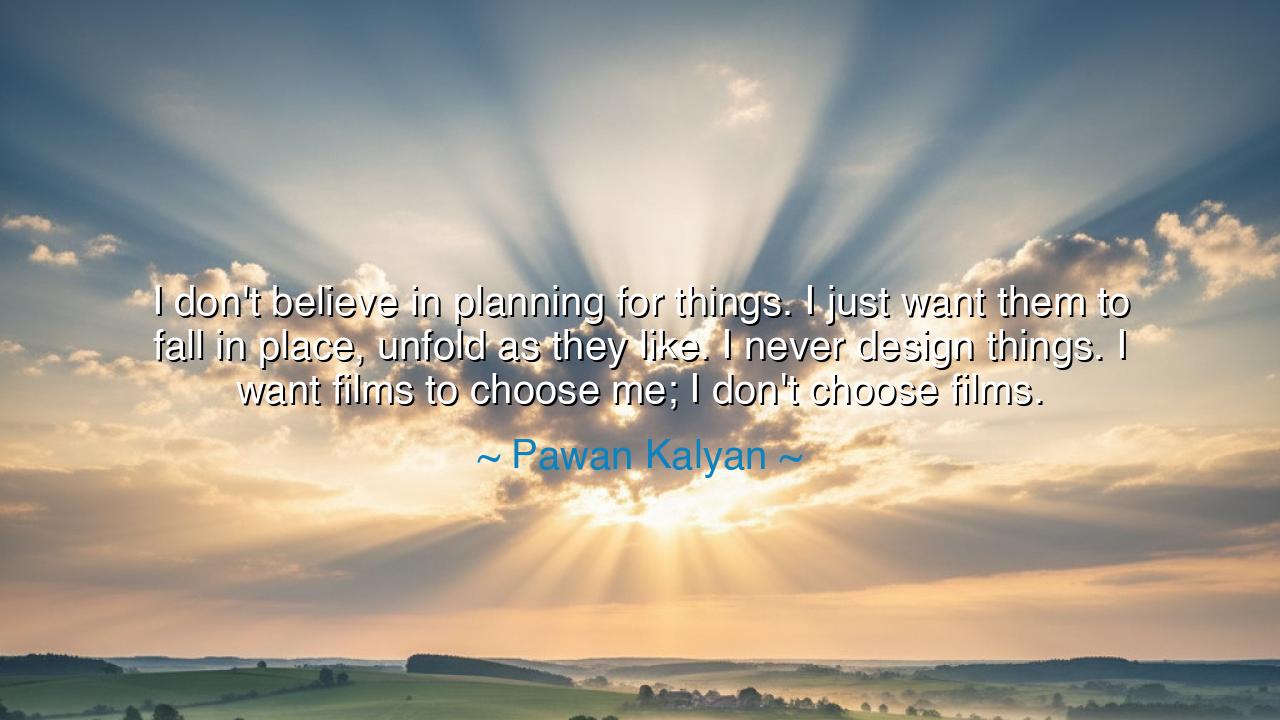
I don't believe in planning for things. I just want them to fall
I don't believe in planning for things. I just want them to fall in place, unfold as they like. I never design things. I want films to choose me; I don't choose films.






In the words of Pawan Kalyan, the actor, philosopher, and warrior of the screen and spirit, there echoes the voice of one who trusts in the rhythm of destiny: “I don’t believe in planning for things. I just want them to fall in place, unfold as they like. I never design things. I want films to choose me; I don’t choose films.” These words are more than a statement about art—they are a meditation on life itself. They speak of surrender, not of weakness, but of faith—faith in the unseen flow of existence, faith that what is meant for us will find us, no matter how winding the path. In an age that worships control and precision, Pawan Kalyan’s words rise like a hymn to spontaneity, reminding us that life, like art, is a sacred unfolding.
To understand the origin of this thought, one must look not at the glamour of cinema, but at the ancient wisdom that whispers through all creation. Long before men wrote scripts or built empires, the sages of the East spoke of dharma—the natural flow of one’s purpose through time. They taught that when one aligns with this flow, there is no need to chase; one simply becomes, and what is meant to be gravitates naturally toward them. Pawan Kalyan’s philosophy carries this same current. When he says that he does not choose films, but allows films to choose him, he speaks like the poet of destiny, letting the river of life decide his course. It is not the passivity of indifference—it is the power of surrender to a higher order, the humility of a soul that trusts life’s divine timing.
This way of being finds its mirror in the story of the great Chinese painter, Wu Daozi, who, when asked how he created such masterpieces, replied, “I let the brush move by itself.” He believed that the spirit of the mountain, the wind, and the river flowed through him. His art was not the product of design, but of harmony. So too, Pawan Kalyan believes that the greatest creations do not come from calculation, but from alignment—from listening deeply to what calls you, and answering that call without resistance. His films, his choices, his path—all are guided not by ambition, but by intuition, that quiet compass of the heart that no plan can replicate.
Yet, in this surrender, there is a paradoxical strength. To plan is to control; to let go is to trust. Many fear this trust, for it demands courage—the courage to accept uncertainty, to walk without a map, to dance with life rather than dictate to it. But the ancients knew that control is illusion. The farmer may sow his seeds, but he cannot command the rain; the sailor may steer his ship, but he cannot order the wind. The wise do what they can, then yield to what must be. This is the wisdom of Pawan Kalyan’s words—to act without attachment, to move with purpose but not with fear.
History, too, is filled with those who achieved greatness not by rigid planning but by listening to the call of life. When Alexander the Great set forth from Macedonia, he did not know how far he would go, nor what worlds awaited him. He followed the pull of his destiny, and in doing so, reshaped history. When Leonardo da Vinci took up his brush or his pen, he did not begin with a blueprint—he began with curiosity, and allowed wonder to lead him. Such lives are not accidents; they are symphonies played in tune with the music of the universe. The planner writes his path in ink, but the visionary writes his in wind.
What Pawan Kalyan reminds us is that life’s design is already perfect, though it may seem chaotic to our limited eyes. When he says, “I never design things,” he is not rejecting intention—he is transcending it. He is speaking from the place where art and destiny meet, where creation is no longer an act of ego but of communion. He trusts that the roles he plays, the stories he tells, are part of something larger than his own will—a dialogue between himself and the universe. To live this way is to live freely, to release the burden of control and allow purpose to reveal itself in its own time.
So, my child, take this teaching to heart: do not force the unfolding of your life. Act with sincerity, but leave room for mystery. Work with discipline, but trust the unseen hand that guides all things. Let opportunities find you as rivers find the sea. When you stop grasping, the right path will come to you—not because you chased it, but because you were still enough for it to recognize you. Remember: the leaf does not choose the wind that carries it, yet it always lands where it must.
For the greatest art, and the greatest life, are not designed—they are discovered. Trust that your journey, too, will fall in place, as Pawan Kalyan said, unfolding as it likes. For the universe has its own script, and those who walk in harmony with it will find that every moment—whether triumph or trial—is part of a masterpiece being written through them.






AAdministratorAdministrator
Welcome, honored guests. Please leave a comment, we will respond soon